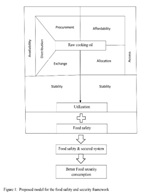
Aparajith Hettiarachchi
University of Moratuwa, Sri Lanka
Title: A model of food security management system for edible oil and oil based products used for cooking purposes
Biography
Biography: Aparajith Hettiarachchi
Abstract
Food safety and food security are interrelated concepts with a profound impact on quality of human life. In 2009, the World Summit on Food Security introduced four pillars of food security namely; availability, access, utilization and stability. Food security could be substantially improved by increased investment and policy reforms. The ISO 22000:2005 family of international standards is one of leading food safety security management systems and it specifically addresses food safety management. However, the scope of food security is insufficiently addressed by the ISO 22000:2005 food safety standards. The purpose of this study is to develop an extended framework of standards opposed to ISO 22000:2005 food safety standards considering one additional pillar in food security, which is food safety, with a special reference to edible oil and oil based products in Sri Lanka. Among 745 Colombo Municipal Council (CMC) registered food preparation facilities, 75 facilities were selected as a stratified random sample. A self-administered online questionnaire was used to identify gaps in local food security practices in edible oil. Of the total responders, 60% were chefs and 40% were hotel managers. Out of total, 73% were eating houses and 11% were hotels. But only from the total sample 10% has been certified for system standards and 50% of it was certified with ISO 22000. About 55% food outlets used palm oil as the main cooking oil and cost, availability and popularity were the main reasons. Only 5% of the sample considered nutritional value and health impact in using cooking oil. However, 52% of the sample used cooking oil for frying despite of the awareness on adverse health consequences from frying with palm oil. The results of the survey revealed that the Sri Lankan food preparation facilities are significantly behind in food security practices because they match more considerable about food safety management principles. Therefore, in addition to food safety management system, we suggest to include four pillars in food security systems into the standard because of significantly food security practices are lacking in our current system.

